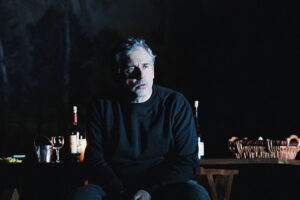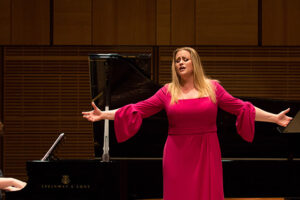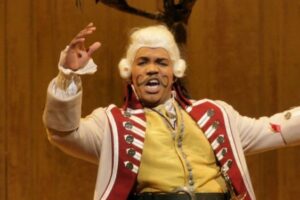
Those of you who have longed to see a theme-park production of Gounod’s simple, romantic opera Romeo et Juliette, rejoice! The Arena di Verona production from 2011, released on DVD
from BelAir Classiques, is all glitz and no substance, all visual effects and no passion, filled from beginning to end with scenic, costume, and lighting effects that actually obscure the story and make no sense whatsoever.
Outside of some fine singing from the unfortunate lovers, this production is simply dreadful. It is as if stage director Francesco Michell decided, “Aw, hell, everybody knows the story so let’s not worry about it. Let’s put on a show!”
The fundamental problem here is that the production completely overwhelms the story. Now granted, the Arena di Verona is an enormous space to fill, but here the massive structures of the set make the essential human interactions of the opera difficult if not impossible to see. And the only consistent visual image is that of bird feathers on the costumes and masks; we are clearly seeing Juliet as a caged bird here. In fact, there are actual caged doves flying about the balcony scene. Juliet’s costume—well, if you remember Bjork’s “swan” dress at the Oscars a few years back, that’s pretty much it.
But in general, the production forces the audience to spend all its attention trying to figure out what’s going on instead of illuminating the music and the story. Why, for instance, are there no couples dancing at Capulet’s ball, but instead we are entertained by twirling dancers, many of whom are men in drag? Why, oh why, do the Montagues arrive at the Capulet ball in a version of the Batmobile featuring huge wings and a propeller on the front? Why is the Nurse costumed and coiffed like Klytemenestra in a bus-and-truck Elektra?
Why are the entrances of Capulet, Frere Laurent, and the Duke made atop huge rolling towers (Frere Laurent enters on what appears to be a huge stained glass Christmas tree ornament; The Duke’s entrance on a giant golden tower takes one straight to the Pharaoh in Aida)?? Never are we allowed a moment of simple communication. Juliet’s “Je veux vivre” here is a public statement, backed by the same drag dancers, twirling in new, garishly flowered skirts. The director apparently does not trust Gounod, the music, or the singers. The distractions are constant from start to finish.
Way back in 1975, I played Claudius in an off-off-Broadway Hamlet where the director cast seven dancers wearing the same costume as Hamlet; they would writhe about during the soliloquies, “acting out” Hamlet’s emotions. It will not surprise you that this was not a success. But here, some 36 years later, poor Juliet’s Potion aria begins simply—for a moment we actually think she’s going to be allowed to do it on her own—but no.
Back come the dancers, now red clad and wearing red face make-up, acting out Juliet’s feelings. They hand her the potion and take it away. They place a knife in her hand when she’s expressing terror. And then, when she begins singing about seeing Tybalt’s ghost, yes, Tybalt appears, now wearing wings and glowering at her. Nothing is left to the obscure possibility that the audience might have an imagination.
I could go on and on (these examples are but the tip of the Spectacle-Regie iceberg) but this particular horse is so dead that beating it would be needlessly cruel. So let’s try to find some solace in the singing. Lovely Nino Machaidze brings us a vibrant and charming Juliette, her lush and lyric soprano marred only be a few glassy high notes. She is also the only singer here who strives mightily to connect with the other characters.
Unfortunately, there is simply no chemistry between her and tenor Stefano Secco as Romeo. Secco sings the role quite well, but lacks the lightness of touch needed for the French style in this youthful role. He is, alas, a lumpish stage presence and there doesn’t seem to be a romantic bone in his body.
There was some good work from Paolo Antognetti as Benvolio, Jean-Francois Borras as Tybalt, and particularly Artur Rucinski as a particularly playful Mercutio, making a fine impression in the Queen Mab aria. Ketevan Kemoklidze, who bears a striking resemblance to mezzo Isabel Leonard, was a perky and sexy Stefano with a rich tone.
The older male voices don’t fare nearly as well. Nicolo Ceriani’s Paris and Giorgio Giuseppini’s Frere Laurent are merely wooly-sounding and generic; the Capulet of Manrico Signorini is an utter disaster. He sounded strained, could not sustain the breath on any phrase, and had a “Deer-in-the-headlights-I don’t-know-what-I’m-doing” look on his face throughout his every appearance.
He was certainly not helped by the glacial tempi of conductor Fabio Mastrangelo, who seems to know no dynamics except slow and slower. This delicate musical confection simply cannot bear this lugubrious pace; many vocal lines were slow almost to distortion. “Je veux vivre”, for instance, can’t express youthful exuberance if it sounds like a dirge, despite Ms. Machaidze’s considerable best efforts.
I can’t think of a reason, other than Machaidze’s performance, to recommend this DVD. If you’re looking to hear Gounod’s Romeo et Juliette, you want to look elsewhere. If you’re interested in garish, Vegas-style spectacle, you have come to the right place.
























Comments